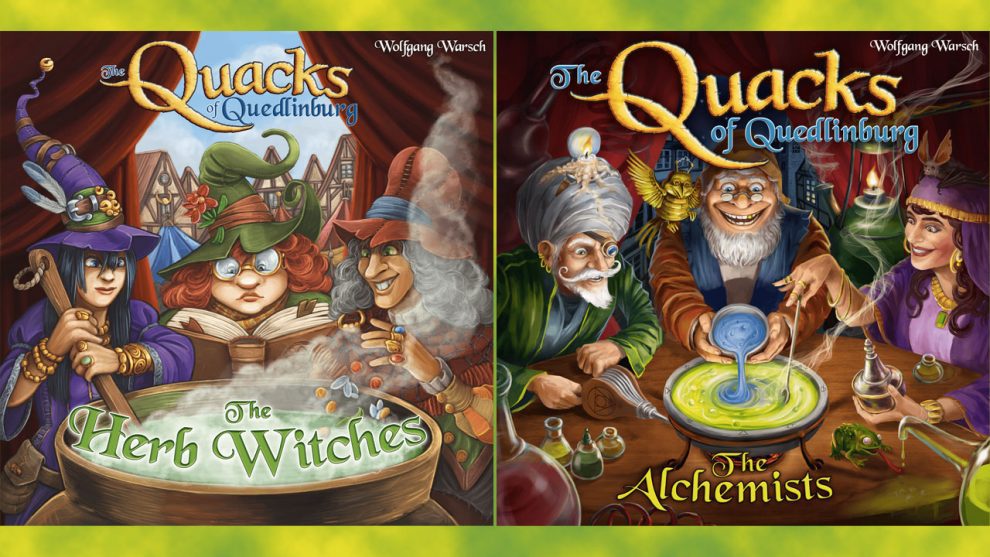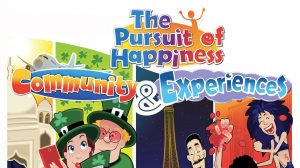The Quacks of Quedlinburg is an outstanding game. Don’t take my word for it though, Quacks won the 2018 Kennerspiel des Jahres Award and was the winner of the 2018 Golden Geek Best Family Board Game. And more impressive than both of those awards, Quacks also prompted Meeple Mountain’s own tabletop guru and Ticket to Ride addict Ashley Gariepy to say in her review: “I dare you to play The Quacks of Quedlinburg and not enjoy it.” High praise indeed.
As is the case with any successful board game, expansions quickly followed: The Herb Witches in 2019 and The Alchemists in 2020. Do they make the cauldron simmer nicely or are they the ingredients that cause the potion to explode?
Ingredient List
Let’s start by saying that both expansions add more variety to what you already have: components for an extra player (The Herb Witches), more variant ingredient books (primarily in The Herb Witches), more fortune teller cards (The Alchemists), and more ingredients (big pumpkin and locoweed in The Herb Witches, just locoweed in The Alchemists). All are worthy additions that can be poured smoothly into your regular games, fortifying everything that makes the original concoction so moreish. Yum!
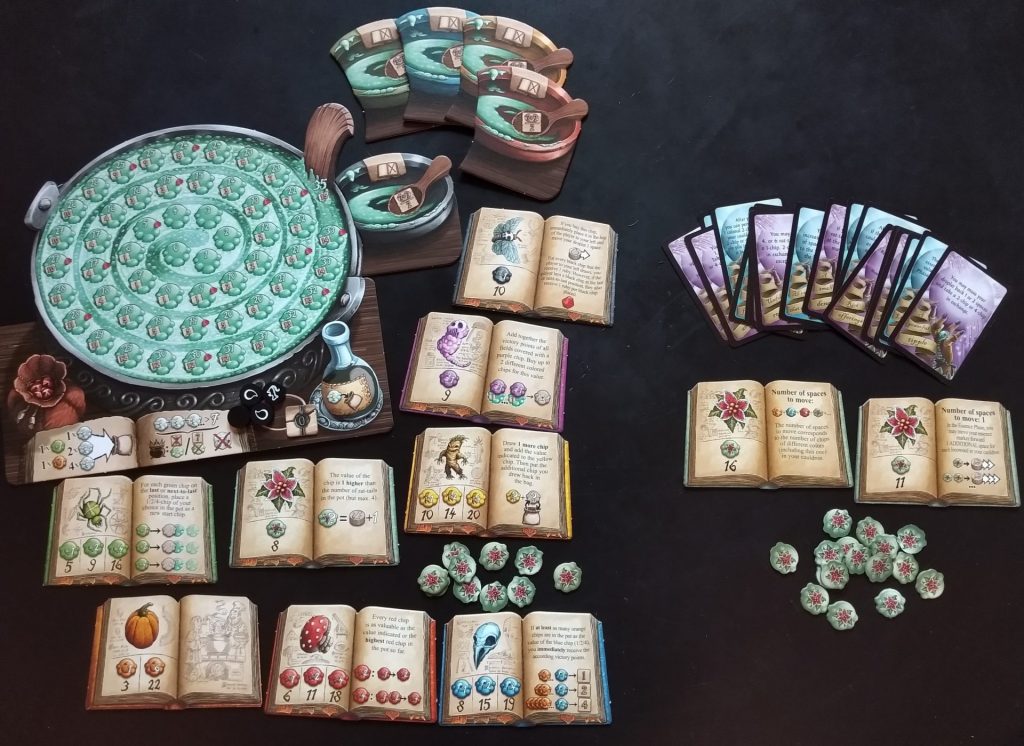
But really you’re here for the headliners, the titular potion-monkeys themselves. Enter the witches and the alchemists, each as subtle and showy respectively as you could hope.
So, what do they do?
Invite The Herb Witches to a game of Quacks and you’ll have access to three single-use special abilities, or some additional points if you don’t use them.
Ohhh, I do like a single sentence summary! Bet you I can do it for The Alchemists, too:
The Alchemists bring along an additional player board with a track along which you try to propel your new essence marker as far as possible in order to get bonus stuff.
Technically I win the bet but given that my single sentence explanation leaves a lot out perhaps we’ll call it a draw. The important thing to know with The Alchemists is that you’ve now got patients to cure with your potions. Craft a tonic that’s full of different ingredients and you’ll move your essence marker up the new essence track. That marker will also move up if your neighbours’ caldrons explode or if you stop with exactly 7 points worth of cherry bombs in your potion.
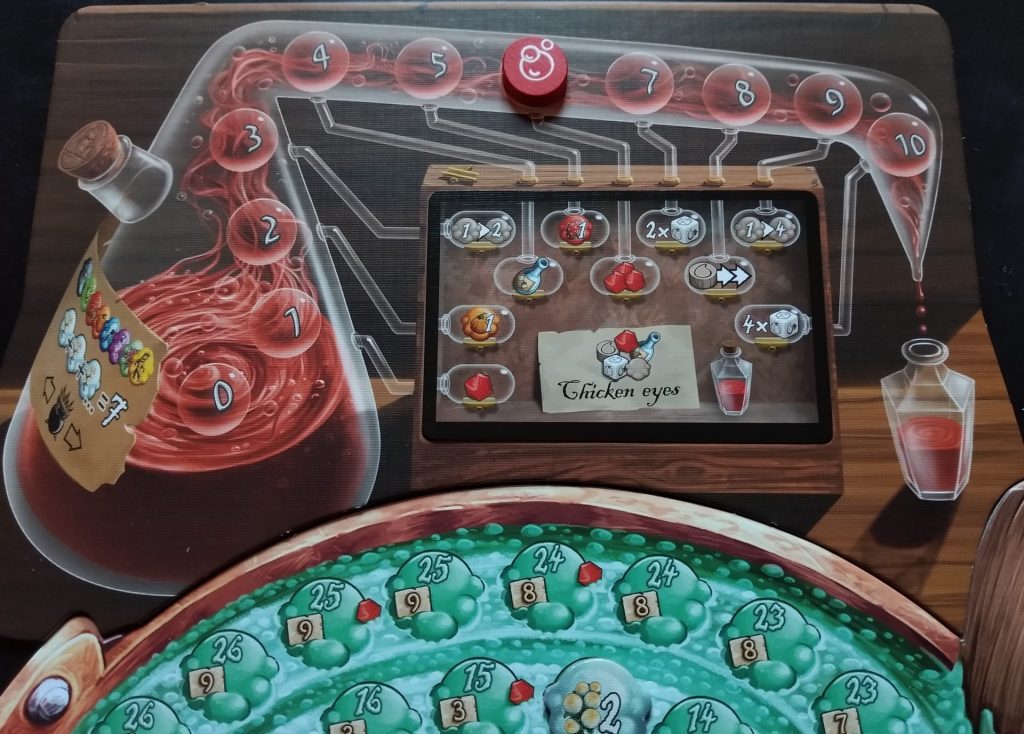
How you then use the collected essence depends on your patient’s condition. Some, like ‘Chicken Eyes’, just shower you with bonuses (ingredients, rubies etc.) at the end of each Preparation phase. Others, such as ‘Carrot Nose’, let you spend essence during the Preparation phase of the following round, shunting ingredients forwards or returning them to your bag to potentially be drawn again.
Stirring the Pot
The difference between these expansions is as big as the difference between my explanations.
The Herb Witches seems the slightest addition of the two; you can teach the game with the witches to new players and they’d be fine. The Alchemists is clearly a reaction to the hobby’s slightly muted response to The Herb Witches, and consequently is a more substantial affair – new player boards, markers, mechanisms, patients, charts, and so on.
Where The Herb Witches adds 3 new decisions across the whole game, The Alchemists adds decisions every round, frequently during the Preparation phase but also potentially influencing your ingredient purchases. More decisions means more control and in a push-your-luck game that can only be a good thing. Surely we can say that The Alchemists is the better of the expansions and leave it at that, right?
Well… more decisions doesn’t necessarily mean more meaningful decisions.
Much like their subject matters, one of these expansions is showy and entertaining, whilst the other quietly gets the job done. This linking of gameplay to theme across expansions is quite possibly the single greatest piece of game design that Wolfgang Warsch has created in an impressive career, a similar interpretation to Terry Pratchett’s thoughts on competent witches and ostentatious but (mostly) inept wizards.
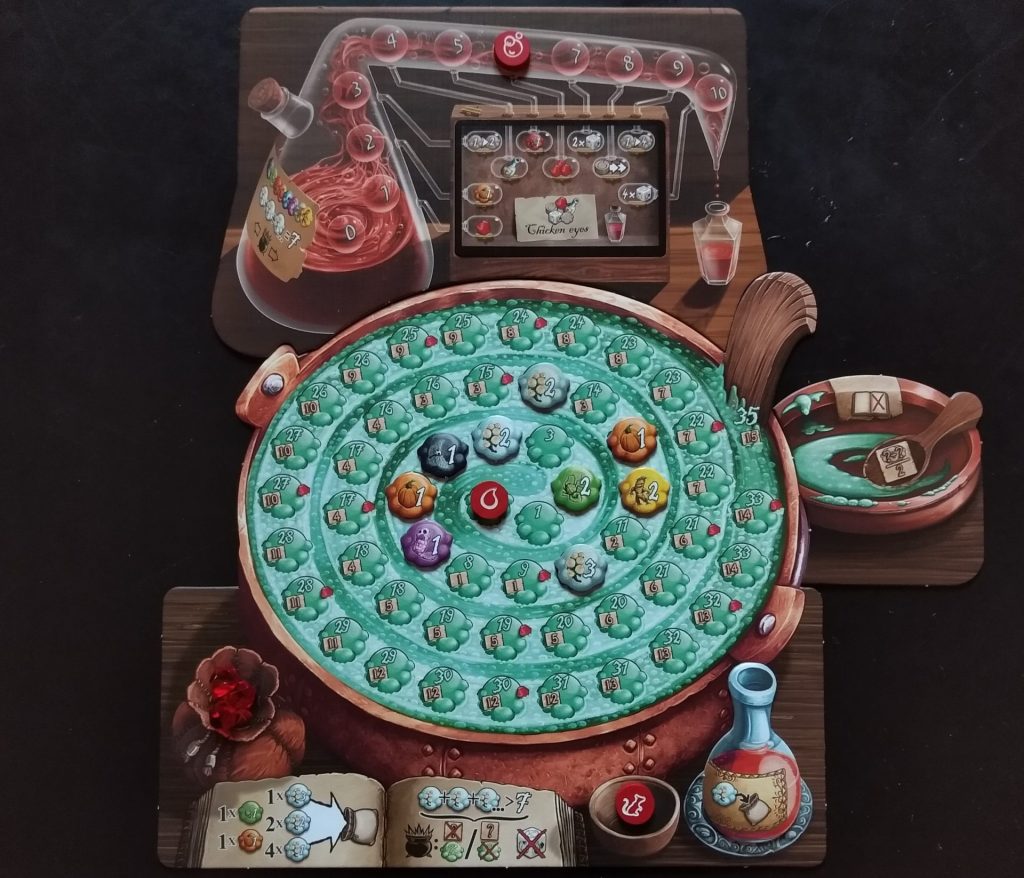
Let’s start with alchemists, magician-like practitioners of pseudoscience, bamboozling their gullible customers with flashy distractions as they pretend to transform base metal into gold.*
The Alchemists presents the player with the illusion of plentiful decisions, but for the most part the only really meaningful choice will be made before the game starts when you select which patient to treat. After that, the new decisions you make are rarely as important as they might appear, despite how involved the process of shuffling your essence marker about makes you feel. Several patients don’t require any input from the player at all. Even with the more interactive patients you can navigate the vast majority of choices on autopilot. Should you spend your essence to push an ingredient forwards in your cauldron? 99% of the time the answer is yes.
Even the impact on what ingredients to buy isn’t as game-changing as you might imagine. None of the many people I’ve played Quacks with over the years has ever focussed so exclusively on just a couple of ingredients that they’d be forced to dramatically change their approach in order to make The Alchemists work for them. It hasn’t affected my ingredient purchasing decisions in the slightest.
The importance of your decisions aside, The Alchemists also doesn’t work thematically. Even though your remedies are bunkum, as a quack you’d be proclaiming their ingredients to demonstrate their ‘healing powers’. Competing quacks claiming to ‘treat’ different ailments by using the same general selection of ingredients, as the expansion encourages you to do, makes little sense.
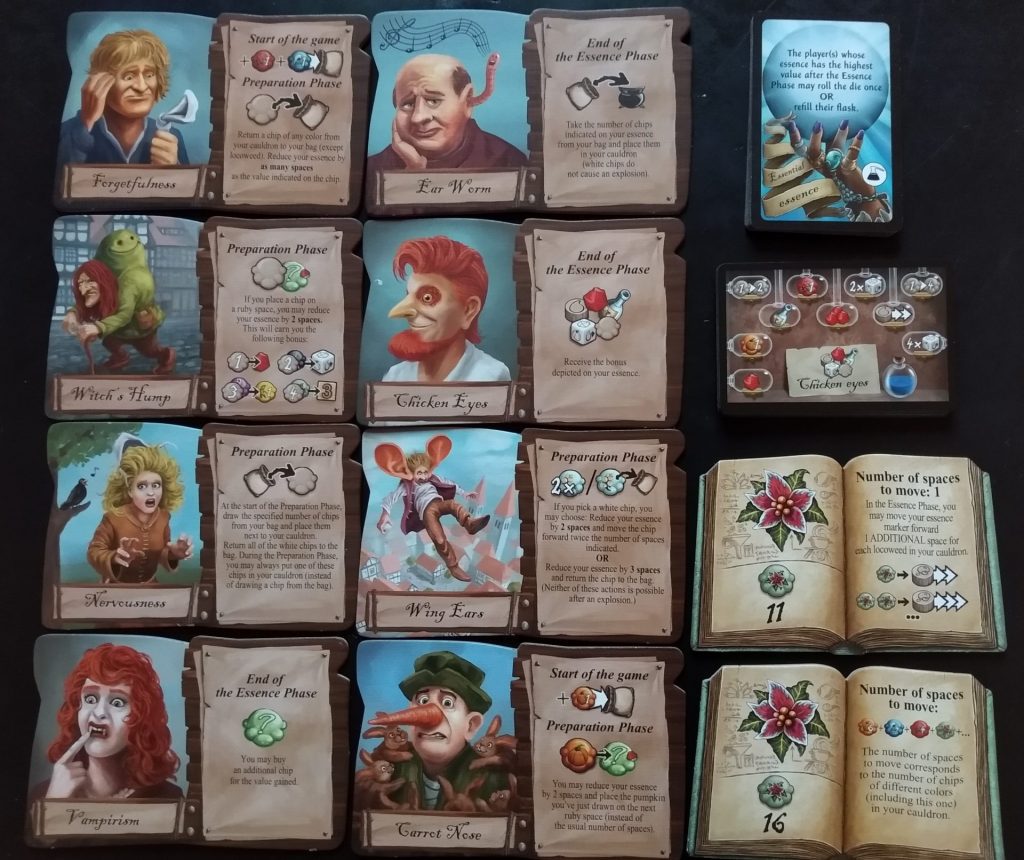
None of this detracts from the fun – Quacks works because of the slot-machine-joy of pulling tokens from a bag and frequently triggering exciting abilities as a result, all tempered by the risk of your cauldron exploding. It’s an incredibly generous game, from the very first round showering you with points and/or funds to buy better ingredients which will in turn provide you with more goodies. The Alchemists super-charges the one-armed bandit action, flinging more treats your way round after round. The endorphin high of getting more good stuff tickles your brain as your droplet marker laps the cauldron board further and faster than ever before.
But it rarely feels earned. The rewards are far greater but the risks remain just as low as ever, neutering what little bite Quacks has. The Alchemists ladles more tasty sugar on an already sweet game but despite the tangible pleasure in gorging on its delights, it’s largely empty calories.
So what about the witches, ancestral pharmacists using the natural healing properties of certain roots and fungi to salve the minor irritations of life.**
The addition of only three decisions across the entire game seems miserly but you receive so few points for not using a witch’s power that it’s less a case of if and more a case of when. The decisions pivot around how to use the witches to the best effect, echoing around your brain and occasionally guiding your play until you actually pay a coin and trigger a witch’s ability.
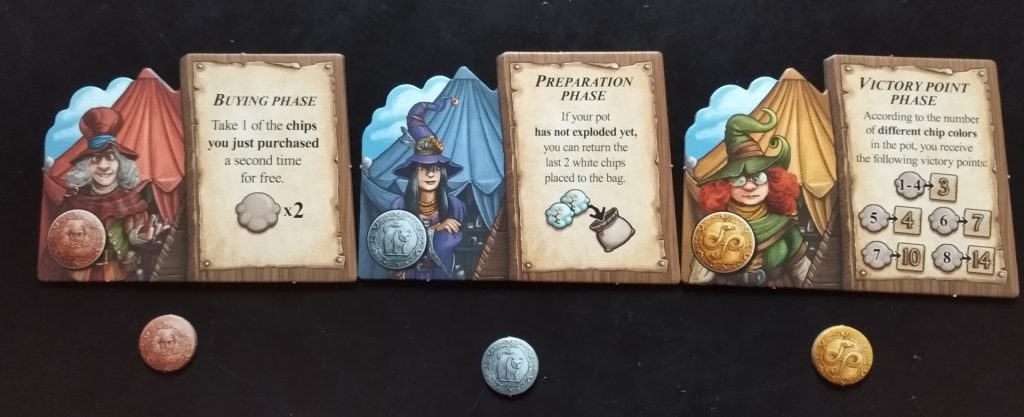
You don’t enjoy the same continuous intravenous drip of pleasure from bonuses gained as with The Alchemists, but triggering a witch’s power at exactly the right moment will make you feel far smarter. Even more importantly, unlike any other element across all of Quacks and its expansions, with The Herb Witches you can actually point to a moment in the game where you messed up rather than were simply unlucky. The risk of not timing their use perfectly justifies the rewards they dole out.
These are fundamentally different types of decisions to those presented in the base game and in The Alchemists, both in terms of timing and reasoning, and their rarity means they feel special as a result.
Some of the witches’ abilities are genuinely game-changing, unique moments in the game where you feel like luck can take a back-seat for a moment because you’re in charge of your own destiny. Which makes it such a shame that a couple of their abilities are downright anti-climactic. They’re still useful but more telegraphed, reducing the timing quandary over when to use them.
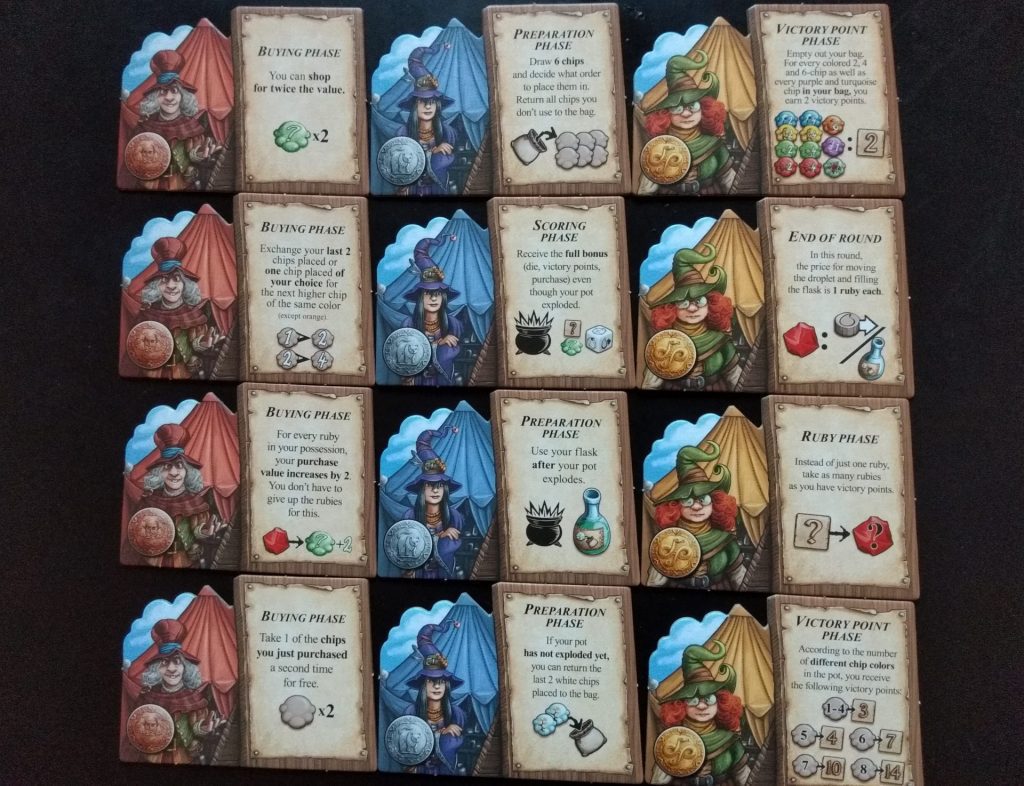
Overall the witches are a small addition that are far more effective than they initially appear. In comparison to The Alchemists they take up hardly any table space, barely extend the game length, aren’t at all fiddly, and give the players more direct control over the outcome of the game.
A Tonic for your Aches
Both expansions are hugely enjoyable additions to an already excellent game. If you tipped either on the table and slapped me round the face with the empty box I would gladly take you up on the challenge any day of the week.
But whilst The Alchemists’ new abilities provide giddy joys and easily-reaped rewards, The Herb Witches adds an understated depth beneath those surface-level pleasures that makes it far more interesting over multiple plays. It’s one of the reasons why The Herb Witches won the 2019 Diamond Climber Award for Best Expansion, whereas The Alchemists wasn’t even nominated in 2020.***
Decision quality is, after all, far better than quantity.
* Or you may think of alchemists as the originators of many of the practices of modern science, valiantly trying to unpick the secrets of the universe.
** Or you may think of witches as the daughters of Gaia, devout servants of Satan or vulnerable innocents wrongly burned at the stake.
*** The other reason being that there wasn’t a Best Expansion category in 2020!
Disclosure: A free copy of The Alchemists was received from the publishers CMYK Games in exchange for an honest, unbiased review. The Herb Witches was purchased by the reviewer for the purposes of comparison. This review is not intended to be an endorsement.


